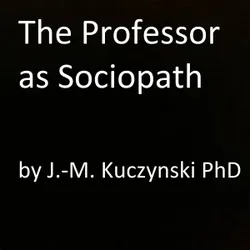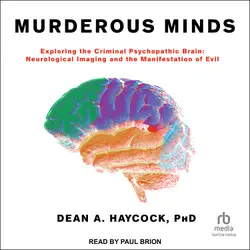Even though the world is governed by laws, human beings are able to be free. In fact, there is no difference between being genuinely free and having a distinctively human psychological architecture. But self-deception and rationalization can result in the replacement of actual beliefs with operational pseudo-beliefs. When this happens, the result is a sociopathic pseudo-person. The difference between a sociopath and a psychopath is that, whereas the sociopath once had a distinctively human psychological architecture, the psychopath never developed such an architecture to begin with. Thus, whereas the sociopath's personality is that of an ossified human, the psychopath has no real personality to speak of. What the psychopath lacks in the way of an actual identity, he replaces with narratives, the primary function of which is to give a semblance of cohesiveness to his otherwise gelatinous psyche, and a secondary function of which is to defraud others. But the psychopath's tendency to defraud others is merely a way of providing external reinforcement for his flimsy narrative-based faux-identity.

Existence and Necessity
J. M. Kuczynski
audiobook
What is an Intention?
J.-M. Kuczynski
audiobook
Thought and Language
J. M. Kuczynski
audiobook
Analysis of: There Will Be Blood: A Study Guide
J.-M. Kuczynski
audiobook
Observations and Aphorisms
J.-M. Kuczynski
audiobook
Straw Jobs Being Created to Fill in for Techno-obsolete Jobs
J.-M. Kuczynski
audiobook
AI Destroys More Jobs Than It Creates : And That's Why We Need Universal Welfare
J.-M. Kuczynski
audiobook
Economics in an Hour : An Interactive Course
J.-M. Kuczynski
audiobook
Kant and Modern Philosophy
J.-M. Kuczynski
audiobook
Jesus vs. Socrates : Religious vs. Secular Perspectives
J.-M. Kuczynski
audiobook
Failure to Sublimate : A Freudian Analysis of the Peter Pan Syndrome
J. M. Kuczynski
audiobook

Poisoned Blood
Philip E. Ginsburg
audiobook
"My Husband's Trying to Kill Me!"
Jim Schutze
audiobook
Cauldron of Blood
Jim Schutze
audiobook
Death in Mud Lick : A Coal Country Fight Against the Drug Companies that Delivered the Opioid Epidemic
Eric Eyre
audiobook
First Responders
audiobook
The Professor as Sociopath
J-M Kuczynski
audiobook
Criminal Shadows
David Canter
audiobook
Unsettled
Ryan Hampton
audiobook
American Pain
John Temple
audiobook
To Hunt a Killer
Julie Mackay, Robert Murphy
audiobook
Sociopath : A Memoir
Patric Gagne
audiobookbook
Murderous Minds
Dean A. Haycock
audiobook
